- Clone
- MWReg30 (See other available formats)
- Regulatory Status
- RUO
- Other Names
- Fibrinogen receptor, gpIIb/IIIa, integrin alpha IIb, CD41a
- Isotype
- Rat IgG1, κ
- Ave. Rating
- Submit a Review
- Product Citations
- publications
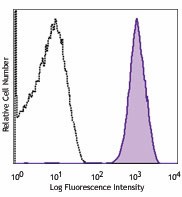
-

C57 BL/6 platelets were stained with CD41 (clone:MWReg30) (filled histogram) or rat IgG1, κ isotype control (open histogram), followed by anti-rat IgG FITC.
| Cat # | Size | Price | Quantity Check Availability | Save | ||
|---|---|---|---|---|---|---|
| 133901 | 50 µg | 72€ | ||||
| 133902 | 500 µg | 234€ | ||||
CD41, also known as integrin α2b and GPIIb, is a transmembrane glycoprotein that is expressed by platelets and megakaryocytes. It was reported that CD41 is also expressed on hematopoietic progenitors. CD41 associates with CD61 (integrin β3) to form complexes that interact with fibrinogen, fibronectin, von Willebrand factor, and thrombin. CD41 is required for platelet adhesion and aggregation. Defect of CD41 leads to disorders of coagulation.
Product DetailsProduct Details
- Verified Reactivity
- Mouse
- Antibody Type
- Monoclonal
- Host Species
- Rat
- Immunogen
- Mouse platelets
- Formulation
- Phosphate-buffered solution, pH 7.2, containing 0.09% sodium azide.
- Preparation
- The antibody was purified by affinity chromatography.
- Concentration
- 0.5 mg/ml
- Storage & Handling
- The antibody solution should be stored undiluted between 2°C and 8°C.
- Application
-
FC - Quality tested
FA - Reported in the literature, not verified in house - Recommended Usage
-
Each lot of this antibody is quality control tested by immunofluorescent staining with flow cytometric analysis. For flow cytometric staining, the suggested use of this reagent is ≤0.25 µg per million cells in 100 µl volume. It is recommended that the reagent be titrated for optimal performance for each application.
- Application Notes
-
Additional reported applications (for the relevant formats) include: depletion of platelets and functional assay in vivo.4,7 The Ultra-LEAF™ purified antibody (Endotoxin < 0.01 EU/µg, Azide-Free, 0.2 µm filtered) is recommended for in vivo studies (Cat. No. 133939).
-
Application References
(PubMed link indicates BioLegend citation) -
- Nieswandt B, et al. 1999. Blood 94:684.
- Teeling JL, et al. 2001. Blood 98:1095.
- Bertrand JY, et al. 2005. P. Natl. Acad. Sci. USA 102:134.
- Nocito A, et al. 2007. Hepatology 45:369. (Deplete)
- Sullivan BP, et al. 2010. Toxicol. Sci. 115:286. (Deplete) PubMed
- van der Heyde HC, et al. 2005. Blood 105:1956. (FA)
- Marjon KD, et al. 2009. J. Immunol. 182:1397. (Deplete)
- Product Citations
-
- RRID
-
AB_1626143 (BioLegend Cat. No. 133901)
AB_1626145 (BioLegend Cat. No. 133902)
Antigen Details
- Structure
- A transmembrane glycoprotein that is expressed by platelets and megakaryocytes
- Distribution
-
Platelets, megakaryocytes, and hematopoietic progenitors
- Function
- Associate with CD61 (integrin β3) to form a complex which plays a major role in platelet adhesion and aggregation
- Ligand/Receptor
- Fibrinogen, fibronectin, von Willebrand factor, thrombin
- Cell Type
- Hematopoietic stem and progenitors, Megakaryocytes, Platelets
- Biology Area
- Immunology
- Molecular Family
- Adhesion Molecules, CD Molecules
- Antigen References
-
1. Bakewell SJ, et al. 2003. P. Natl. Acad. Sci. USA 100:14205.
2. Phillips DR, et al. 1991. Cell. 65:359. - Gene ID
- 16399 View all products for this Gene ID
- UniProt
- View information about CD41 on UniProt.org
Related Pages & Pathways
Pages
Related FAQs
Other Formats
View All CD41 Reagents Request Custom Conjugation| Description | Clone | Applications |
|---|---|---|
| Brilliant Violet 421™ anti-mouse CD41 | MWReg30 | FC |
| Purified anti-mouse CD41 | MWReg30 | FC,FA |
| FITC anti-mouse CD41 | MWReg30 | FC |
| PE anti-mouse CD41 | MWReg30 | FC |
| Alexa Fluor® 488 anti-mouse CD41 | MWReg30 | FC |
| APC anti-mouse CD41 | MWReg30 | FC |
| PE/Cyanine7 anti-mouse CD41 | MWReg30 | FC |
| PerCP/Cyanine5.5 anti-mouse CD41 | MWReg30 | FC |
| Brilliant Violet 605™ anti-mouse CD41 | MWReg30 | FC |
| Brilliant Violet 510™ anti-mouse CD41 | MWReg30 | FC |
| Purified anti-mouse CD41 (Maxpar® Ready) | MWReg30 | FC,CyTOF® |
| APC/Cyanine7 anti-mouse CD41 | MWReg30 | FC |
| Alexa Fluor® 700 anti-mouse CD41 | MWReg30 | FC |
| Biotin anti-mouse CD41 | MWReg30 | FC |
| Pacific Blue™ anti-mouse CD41 | MWReg30 | FC |
| Alexa Fluor® 647 anti-mouse CD41 | MWReg30 | FC |
| PE/Dazzle™ 594 anti-mouse CD41 | MWReg30 | FC |
| TotalSeq™-A0443 anti-mouse CD41 | MWReg30 | PG |
| Ultra-LEAF™ Purified anti-mouse CD41 | MWReg30 | FC,FA |
| TotalSeq™-B0443 anti-mouse CD41 | MWReg30 | PG |
| TotalSeq™-C0443 anti-mouse CD41 | MWReg30 | PG |
Customers Also Purchased
Compare Data Across All Formats
This data display is provided for general comparisons between formats.
Your actual data may vary due to variations in samples, target cells, instruments and their settings, staining conditions, and other factors.
If you need assistance with selecting the best format contact our expert technical support team.
-
Brilliant Violet 421™ anti-mouse CD41
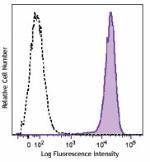
C57BL/6 platelets were stained with CD41 (clone MWReg30) Bri... -
Purified anti-mouse CD41
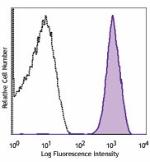
C57 BL/6 platelets were stained with CD41 (clone:MWReg30) (f... -
FITC anti-mouse CD41
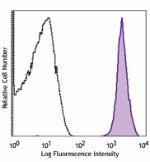
C57 BL/6 platelets were stained with CD41 (clone: MWReg30) F... -
PE anti-mouse CD41
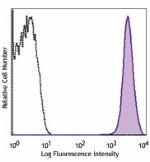
C57 BL/6 platelets were stained with CD41 (clone: MWReg30) P... -
Alexa Fluor® 488 anti-mouse CD41
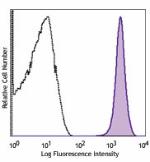
C57 BL/6 platelets were stained with CD41 (clone: MWReg30) A... -
APC anti-mouse CD41
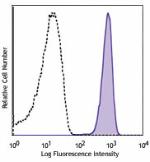
Mouse platelets were stained with either anti-mouse CD41 (cl... -
PE/Cyanine7 anti-mouse CD41
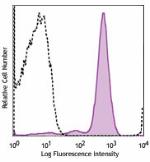
Mouse platelets were stained with anti-mouse CD41 (clone MWR... -
PerCP/Cyanine5.5 anti-mouse CD41
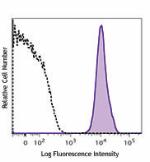
Mouse platelets were stained with anti-mouse CD41 (clone MWR... -
Brilliant Violet 605™ anti-mouse CD41
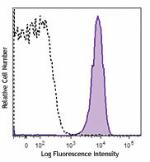
C57BL/6 platelets were stained with CD41 (clone MWReg30) Bri... -
Brilliant Violet 510™ anti-mouse CD41
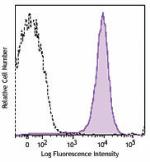
C57BL/6 platelets were stained with CD41 (clone MWReg30) Bri... -
Purified anti-mouse CD41 (Maxpar® Ready)
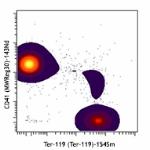
Platelets isolated from mouse blood were stained with 143Nd-... -
APC/Cyanine7 anti-mouse CD41
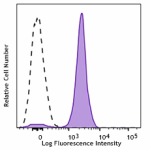
BALB/c mouse platelets were stained with CD41 (clone MWReg30... -
Alexa Fluor® 700 anti-mouse CD41
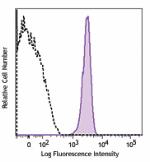
BALB/c mouse platelets were stained with CD41 (clone MWReg30... -
Biotin anti-mouse CD41
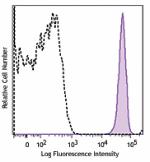
BALB/c mouse platelets were stained with biotinylated CD41 (... -
Pacific Blue™ anti-mouse CD41
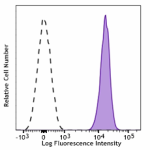
BALB/c mouse platelets were stained with CD41 (clone MWReg30... -
Alexa Fluor® 647 anti-mouse CD41
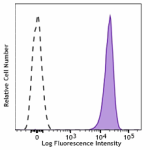
BALB/c mouse platelets were stained with CD41 (clone MWReg30... -
PE/Dazzle™ 594 anti-mouse CD41
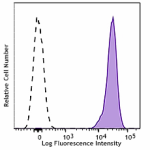
BALB/c mouse platelets were stained with CD41 (clone MWReg30... -
TotalSeq™-A0443 anti-mouse CD41
-
Ultra-LEAF™ Purified anti-mouse CD41

C57 BL/6 platelets were stained with CD41 (clone MWReg30) (f... -
TotalSeq™-B0443 anti-mouse CD41
-
TotalSeq™-C0443 anti-mouse CD41
 Login / Register
Login / Register 






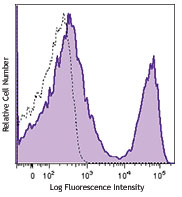
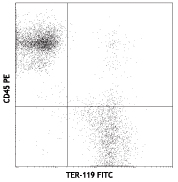
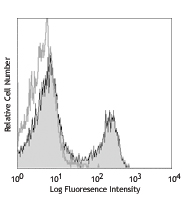
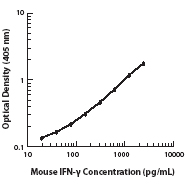



Follow Us